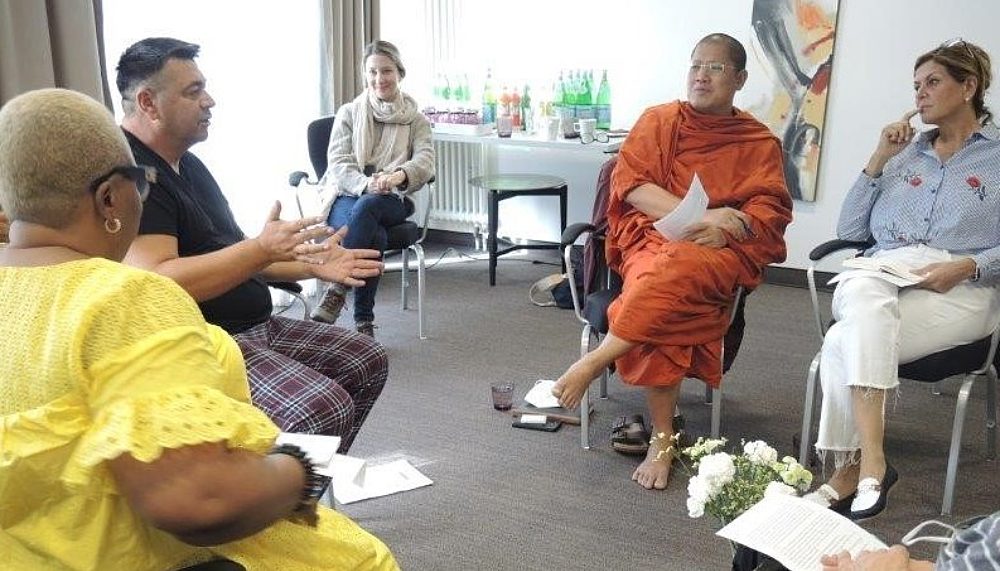PAST PROJECT
A network for faith-based mediators

The project accompanies and builds the capacity of a group of nine faith-based mediators through exchanges and peer-to-peer learning.
Timeframe: 2020 - 2022
Religious peacemakers often play a critical role in conflict transformation processes in many countries. In this project, in cooperation with the Network for Religious and Traditional Peacemakers (NRTP) and supported by the German Federal Foreign Office we establish the Network of Faith-Based Mediators (NFM), by accompanying and building the capacity of a group of nine faith-based mediators. The participants of the network were chosen in close collaboration with the German Federal Foreign Office, NRTP and the Berghof Foundation. Within the network the faith-based mediators exchange experiences and methods (peer-to-peer learning), thereby strengthening their work in local and regional mediation processes. The project also aims to develop and support concrete mediation support activities and provide faith-based mediation support beyond these contexts.
Background
Over 80% of the World’s population self-identify as a member of a religious group. Faith-based/religious actors (faith-based mediators, FMs) have played a crucial role as peacemakers in conflict contexts around the world. Prominent Insider FMs, such as Archbishop Desmond Tutu, as well as Pastor James Wuye and Imam Muhammad Ashafa from Nigeria, have been recognised for their unique position and specific strength: high legitimacy and credibility, specific entry points and access to hard-to-reach actors and a very good understanding of their conflict context and dynamics. Amongst others, these features were recognised, in a declaration by the UN General Assembly in 2012. At the same time, the declaration also emphasises that the potential of FMs is not sufficiently valued yet. Subsequently, the Berghof Foundation commissioned NRTP to conduct a baseline study in 2015, which explored and further nuanced the concept of tradition- and faith-oriented insider mediators (TFIMs). Among these actors, FMs serve as insider mediators who use tradition and faith as guidance and direction, inspiration and motivation, and strategy and methodology in their peace mediation efforts in a constructive manner. An FM can be either explicit (traditional authority/leader, religious authority/head, spiritual leader, head/member of a religious organization) or implicitly (head of community/civil society/actor concerned with tradition and faith and with the above-mentioned actors) tradition- and faith-oriented. The study highlights the diversity of mediating roles of FMs, such as supporting peace processes in protracted armed conflicts by engaging armed actors (state and non-state) and communities, facilitating intra- and interfaith dialogue, mobilising nonviolent action for social change, and creating peaceful coexistence.
The baseline study confirmed the known fact that FMs have a need of being more recognised by the international community for the peacebuilding and mediation work they are already doing and for the faith-based techniques they are using, and corresponding with that, need better financial and other support. FMs need more peer exchange and technical support in process design, theories and technical know-how concerning conflict transformation, as well as a better cooperation with local, regional and international actors. Another need that was identified by the study was that FMs needed to improve their conflict sensitivity to inclusivity issues in patriarchal and hierarchical systems.
This project aims to fulfil some of these needs identified by the baseline study, by building a global network of faith-based mediators, giving them a space for peer exchange, access to experts on mediation and conflict transformation issues and thus strengthening the complementarity of secular and faith-based approaches for more effective peace processes, as well as valuing the potential of faith-based mediators for the constructive resolution of conflicts. Currently, the project works with nine faith-based mediators from different conflict contexts, including Bosnia Herzegovina, Cambodia, Cameroon, Colombia, Myanmar, Nigeria, Somalia, South Sudan and Syria.
Partners and Funding
Our partner is the Network for Religious and Traditional Peacebuilders (NRTP).
The project is funded by and implemented in close collaboration with the German Federal Foreign Office.
Publications
- Mubashir, Mir & Vimalarajah, Luxshi (2016), “Tradition / Faith-Oriented Insider Mediators (TFIMs) as Crucial Actors in Conflict Transformation – Potential, Constraints, / Opportunities for Collaborative Support (Baseline Study)”.
- Blog post by Nura Detweiler: Exploring religion as a force for conflict transformation.
Team members
Nura Detweiler
Owen Frazer
Carla Schraml
Luxshi Vimalarajah
Matthias Wevelsiep
Media contact
You can reach the press team at:
+49 (0) 177 7052758
email hidden; JavaScript is required


